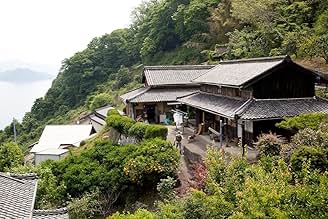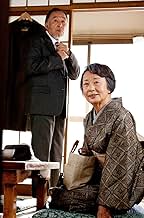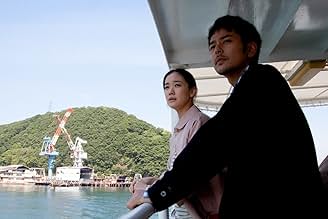IMDb-BEWERTUNG
7,5/10
2308
IHRE BEWERTUNG
Füge eine Handlung in deiner Sprache hinzuIn this update of Yasujiro Ozu's "Tokyo Story", a retired schoolteacher and his wife visit their three working children in modern-day Tokyo.In this update of Yasujiro Ozu's "Tokyo Story", a retired schoolteacher and his wife visit their three working children in modern-day Tokyo.In this update of Yasujiro Ozu's "Tokyo Story", a retired schoolteacher and his wife visit their three working children in modern-day Tokyo.
- Regie
- Drehbuch
- Hauptbesetzung
- Auszeichnungen
- 2 Gewinne & 16 Nominierungen insgesamt
Empfohlene Bewertungen
Legendary Japanese filmmaker remakes (or perhaps retells?) one of the most famous Japanese movies of all time, Tokyo Story, approximately 60 years after its release, with a very similar plot but a very different modern day setting. It does, in a way, highlight how timeless the themes are surrounding getting old and what happens when a family starts to reject or ignore its eldest members that were already well explored by the original classic.
It's arguably not a necessary remake because of how well the first still holds up, but Yamada shoots it well, as always, and gets naturalistic, compelling performances out of his fairly large cast. Hitting the same beats as the first and having similar strengths and a very comparable slow pace does make watching this feel more than a little familiar at times, even if it's been years and years since you've seen the original (like my personal experience).
Yamada clearly has a lot of love for the original, and it shaped his style and many of his films that he's been making for nearly 60 years now, so maybe it doesn't matter how relevant the audience thinks it is? If he did it for himself, and because he wanted to tribute that original, then he's earned the right to do that, in all honesty.
Thankfully, those choosing to watch will still experience quite a nice film (although it is better to watch the original first, and then maybe check this one out too, if you liked it).
It's arguably not a necessary remake because of how well the first still holds up, but Yamada shoots it well, as always, and gets naturalistic, compelling performances out of his fairly large cast. Hitting the same beats as the first and having similar strengths and a very comparable slow pace does make watching this feel more than a little familiar at times, even if it's been years and years since you've seen the original (like my personal experience).
Yamada clearly has a lot of love for the original, and it shaped his style and many of his films that he's been making for nearly 60 years now, so maybe it doesn't matter how relevant the audience thinks it is? If he did it for himself, and because he wanted to tribute that original, then he's earned the right to do that, in all honesty.
Thankfully, those choosing to watch will still experience quite a nice film (although it is better to watch the original first, and then maybe check this one out too, if you liked it).
A remake of Yasujiro Ozu's Tokyo Story (1953), which is widely regarded as one of the finest films ever made. Director Yoji Yamada follows the plot of the earlier film closely (though he doesn't borrow Ozu's stylistic touches; thus, this is necessarily a more conventional movie).
There are also changes in some of the characters. The youngest children, Kyoko and Keizo, do not exist in this version. Noriko here is not the widowed wife of their fallen son in the war, but the girlfriend of their son Shoji (who is alive here, and works as a theater decorator). Noriko is played by Yu Aoi, who is pretty and charming, though she lacks the screen charisma Setsuko Hara has in the original version (she is given less screen time, also). Also, I notice that in this version the elder children and the grandchildren are less rude to the elder couple. For instance, the eldest daughter Shige, as played as Tomoko Nakajima, is not as mean and bitchy as Haruko Sugimura was in the original. And the grandfather Shukichi, is less nice here than in the original version. He openly questions his children, especially Shoji, which in the original only did obliquely.
Obviously, this film is not up to the level of the original, but it is a well made, pleasant movie to watch.
There are also changes in some of the characters. The youngest children, Kyoko and Keizo, do not exist in this version. Noriko here is not the widowed wife of their fallen son in the war, but the girlfriend of their son Shoji (who is alive here, and works as a theater decorator). Noriko is played by Yu Aoi, who is pretty and charming, though she lacks the screen charisma Setsuko Hara has in the original version (she is given less screen time, also). Also, I notice that in this version the elder children and the grandchildren are less rude to the elder couple. For instance, the eldest daughter Shige, as played as Tomoko Nakajima, is not as mean and bitchy as Haruko Sugimura was in the original. And the grandfather Shukichi, is less nice here than in the original version. He openly questions his children, especially Shoji, which in the original only did obliquely.
Obviously, this film is not up to the level of the original, but it is a well made, pleasant movie to watch.
Cinephiles will tell you about the greatness of Tokyo Story, a 1953 Japanese film directed by Yasujiro Ozu. The story about an aging couple who travel to Tokyo to visit their grown children, only to have them being too busy to pay them much attention, is regarded as one of the most poignant tales ever told on screen. And as with every remarkable piece of work, there is a need to introduce it to a wider audience, hence the contemporary filmmakers' decision to produce Tokyo Family, an interpretation which you can either define as a remake, a tribute or an update.
Yoji Yamada (The Twilight Samurai, The Hidden Blade) takes on this story and gives it a relatable angle to today's viewers. The plot is identical to the classic: An old couple from an isolated part of Japan takes the train to Tokyo to spend time with their grown children, not expecting them to be too occupied and indifferent to host them. A tragic death reunites the family in a quiet country town and has them coming to terms with how they have drifted apart because of selfishness.
Made 60 years after the premiere of Tokyo Story and celebrating the 50th anniversary of the respected Ozu's death, this 146 minute film serves as a kind reminder of the importance of family ties. This is especially current in today's society, considering how new media and social expectations have changed how family members interact with each other.
With that said, Yamada's latest work does not seem to offer anything refreshing. That is nothing surprising though, considering how Yamada was an assistant director of the earlier film. The 1954 graduate of Tokyo University painstakingly attempts to replicate the style of the original, from its slow pacing to how important events are revealed in dialogue instead of being shown on screen.
Those who have watched the original (a large group would probably be film students) may find this version uninspiring, and the younger ones may find their patience being tested with the unhurried storytelling. However, do not let this make you feel that this is an unimportant piece of work. There are still pertinent themes which we as children ought to understand in this evergreen tale. There are times you know how things should work, but nothing works better than a screen visualisation to remind you of how things should be.
There is strong acting from the cast here – Isao Hashizume and Kazuko Yoshiyuki shine in their roles as the unassuming parents who travel to bustling Tokyo from their quiet home on a small island, Masahiko Nishimura's unassuming screen presence gets to you as he plays a GP who runs a clinic from his home, Tomoko Nakajima flaunts her chops as a busy beauty parlour manager, while the charismatic Satoshi Tsumabuki takes on the role of the youngest son who is a freelance stagehand. Each member of the ensemble cast plays his or her character without outshining each other, and gives ample room for performance in the film's many key scenes.
While Tokyo Family may not go down film history as a classic, it is still a commendable piece of work worth your time – if you are willing to sit down and appreciate life's slower moments.
Yoji Yamada (The Twilight Samurai, The Hidden Blade) takes on this story and gives it a relatable angle to today's viewers. The plot is identical to the classic: An old couple from an isolated part of Japan takes the train to Tokyo to spend time with their grown children, not expecting them to be too occupied and indifferent to host them. A tragic death reunites the family in a quiet country town and has them coming to terms with how they have drifted apart because of selfishness.
Made 60 years after the premiere of Tokyo Story and celebrating the 50th anniversary of the respected Ozu's death, this 146 minute film serves as a kind reminder of the importance of family ties. This is especially current in today's society, considering how new media and social expectations have changed how family members interact with each other.
With that said, Yamada's latest work does not seem to offer anything refreshing. That is nothing surprising though, considering how Yamada was an assistant director of the earlier film. The 1954 graduate of Tokyo University painstakingly attempts to replicate the style of the original, from its slow pacing to how important events are revealed in dialogue instead of being shown on screen.
Those who have watched the original (a large group would probably be film students) may find this version uninspiring, and the younger ones may find their patience being tested with the unhurried storytelling. However, do not let this make you feel that this is an unimportant piece of work. There are still pertinent themes which we as children ought to understand in this evergreen tale. There are times you know how things should work, but nothing works better than a screen visualisation to remind you of how things should be.
There is strong acting from the cast here – Isao Hashizume and Kazuko Yoshiyuki shine in their roles as the unassuming parents who travel to bustling Tokyo from their quiet home on a small island, Masahiko Nishimura's unassuming screen presence gets to you as he plays a GP who runs a clinic from his home, Tomoko Nakajima flaunts her chops as a busy beauty parlour manager, while the charismatic Satoshi Tsumabuki takes on the role of the youngest son who is a freelance stagehand. Each member of the ensemble cast plays his or her character without outshining each other, and gives ample room for performance in the film's many key scenes.
While Tokyo Family may not go down film history as a classic, it is still a commendable piece of work worth your time – if you are willing to sit down and appreciate life's slower moments.
I was anticipating a respectful homage to Ozu's Tokyo Story. What I got was respectful but a very different take on Ozu's classic. Watching the first half was a little worrying as the movie took its time establishing the characters and setting the scene, with the obligatory nods to Ozu's super low camera angles. Had Yoji Yamada lost his way while eulogizing his hero? But this start made the second half really shine as you really knew the characters, and became involved in their actions since we understood their faults, and wondered if, or when, they were ever going to develop and change. Fans of Yamada will again delight in his subtle depictions of contemporary Japan. He has long championed the innate goodness of ordinary people living in suburbs and villages away from the tourist-trampled extremes of Shinjuku, Ginza or Gion. Although his characters are imperfect, they exemplify Yamada's profound respect for the institutions of family and friendship. Additionally, Im not sure if this was a deliberate subplot or not but, students of Japanese gender-based communication style differences will find a minefield of scenes to use for generating discussion. Highly recommended for those who also believe in Yamada's values.
The plot goes around an elderly couple, parents of children, who decide in the twilight of their lives to visit the capital of their country and thus meet their sons, daughter and grandchildren. Many things happen during the visit, that one cannot really imagine, itr didn´t go well. At certain point, the film reminds me somewhat Visconti´s "Rocco and his brothers (1960)". The behavior of the parents, their way of thinking, is far from that of their sons and daughter. The epilogue of the movie is very educational, worth to be analyzed, let anyone thinking if something can be done to correct some aspects of their lives, which may help life´s improvement in today's modern society. One cannot just live thinking about the material, the spiritual has to occupy good space in our lives. This film shows that good movies can be made without always having to deal with crime scenes, fictions, or with almost pornographic scenes. The cinema may serve to entertain, true, but equally to educate, and this film teaches and educates.
Wusstest du schon
- WissenswertesDirector Yoji Yamada delayed principal photography of Tokyo Kazoku, a remake of Yasujiro Ozu's Tokyo Story, from the beginning of April 2011 due to the devastating Tohoku earthquake and tsunami, and subsequent Fukushima meltdown, which occurred on March 11th 2011. He would have to recast the film and partly reworked the script to reflect post-3/11 Japan.
- VerbindungenReferenced in Kazoku wa tsuraiyo (2016)
Top-Auswahl
Melde dich zum Bewerten an und greife auf die Watchlist für personalisierte Empfehlungen zu.
- How long is Tokyo Family?Powered by Alexa
Details
- Erscheinungsdatum
- Herkunftsland
- Offizieller Standort
- Sprache
- Auch bekannt als
- Токійська родина
- Produktionsfirmen
- Weitere beteiligte Unternehmen bei IMDbPro anzeigen
Box Office
- Weltweiter Bruttoertrag
- 17.370.130 $
- Laufzeit2 Stunden 26 Minuten
- Farbe
- Sound-Mix
- Seitenverhältnis
- 1.85 : 1
Zu dieser Seite beitragen
Bearbeitung vorschlagen oder fehlenden Inhalt hinzufügen




























